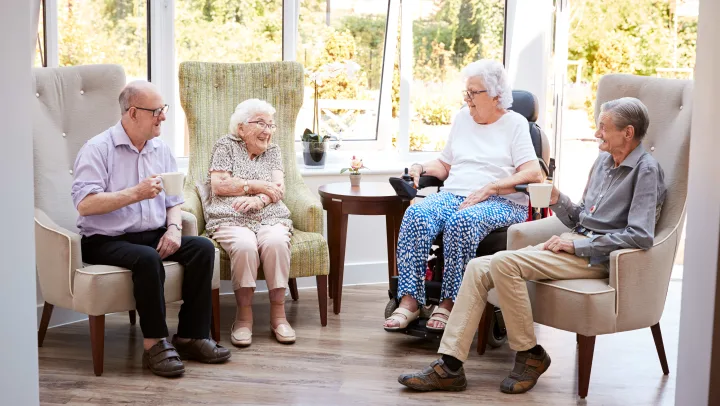Trusted Memory Care facilities providing 24/7 support and security.
Trusted Memory Care facilities providing 24/7 support and security.
Blog Article
Recognizing Exactly How Assisted Living Sustains Patients With Dementia Care Requirements
Aided living centers are progressively identified for their critical function in addressing the complicated treatment needs of clients with dementia. Assisted Living. By supplying an organized yet nurturing atmosphere, these facilities not only promote security and health yet also promote a feeling of freedom via personalized care plans. Involving tasks and socialization possibilities are indispensable to boosting cognitive feature and psychological wellness. However, the nuances of just how these aspects engage to create a supportive community warrant closer exam, specifically in recognizing their lasting influence on locals' top quality of life.
Review of Mental Deterioration Care
Mental deterioration care is progressively essential as the frequency of dementia-related problems rises among aging populations. This growing market trend requires a comprehensive understanding of mental deterioration and the different approaches to care. Dementia encompasses a variety of cognitive impairments that conflict with life, affecting memory, reasoning, and interaction capabilities. The problem can differ substantially in its presentation, needing customized treatment methods to meet private requirements.
Efficient dementia treatment entails a multidisciplinary strategy, including clinical, mental, and social support. Healthcare professionals, caregivers, and member of the family must collaborate to create a caring environment that promotes the well-being of individuals with dementia. Key components of mental deterioration care include individualized treatment strategies, cognitive excitement therapies, and behavioral treatments intended at enhancing quality of life.
Furthermore, it is necessary to acknowledge the emotional and emotional difficulties faced by both people and caretakers. Education and learning and training for caretakers play a crucial function in promoting understanding and empathy, consequently boosting interactions with those affected by mental deterioration. As the need for mental deterioration care continues to increase, the emphasis must continue to be on delivering compassionate, person-centered treatment that respects the self-respect and choices of individuals living with this problem.
(Memory Care Charlotte)
Duty of Assisted Living Facilities
Aided living centers play a vital role in giving take care of people with dementia, supplying an encouraging setting that stabilizes independence with the necessary help. These facilities are developed to accommodate the unique needs of residents, advertising a feeling of area while guaranteeing safety and well-being.
In an assisted living setting, experienced team member give ongoing assistance, helping with everyday tasks such as bathing, clothing, and medicine management. This degree of care is important for individuals with mental deterioration, that might fight with these tasks as a result of cognitive decline. Additionally, facilities usually include memory-enhancing programs and social activities customized to stimulate cognitive functioning and motivate social communication.
The physical atmosphere of nursing home is likewise optimized for safety and security, featuring protected entryways, well-lit paths, and clear signage to aid homeowners navigate their surroundings. These areas promote a sense of belonging, reducing the sensations of isolation that people with mental deterioration may experience.
Personalized Treatment Program
To make sure that each resident obtains the most proper treatment, individualized care plans are important in assisted living centers for people with dementia. These strategies are customized to meet the one-of-a-kind needs, choices, and obstacles faced by each citizen, promoting their self-respect and lifestyle.
The advancement of an individualized care plan normally starts with a detailed assessment performed by medical care professionals. Assisted Living. This evaluation reviews the individual's cognitive capabilities, physical wellness, psychological health, and social preferences. Input from member of the family and the resident themselves is crucial, as it offers important insights into their history, routines, and personal rate of interests
As soon as the assessment is complete, a multidisciplinary team collaborates to create a care strategy that details certain objectives and interventions. This might consist of medicine administration, daily living help, and behavior techniques tailored to mitigate anxiety or agitation.
Routine testimonials and updates to the treatment plan ensure it remains relevant as the person's problem evolves. Memory Care. By focusing on individualized treatment, helped living facilities can improve the total health of residents with mental deterioration, promoting an atmosphere that appreciates their uniqueness while addressing their treatment requires properly
Involving Activities and Socialization
Involving tasks and socializing play a crucial role in boosting the lifestyle for homeowners with mental deterioration in assisted living centers. These activities are made to promote cognitive feature, promote psychological wellness, and foster links amongst residents. Organized programs, such as art treatment, music sessions, and reminiscence therapy, give chances for individuals to express themselves artistically while likewise causing positive memories.
Socializing is similarly essential, as it battles feelings of seclusion Dementia Care Charlotte and solitude that can come with dementia. Group tasks, including games, team trips, and public dining, motivate communication and help homeowners develop encouraging connections with peers and caretakers. This feeling of neighborhood not just enriches their everyday experiences yet likewise contributes to a much more stable psychological atmosphere.
Furthermore, engaging tasks can be customized to private preferences and cognitive levels, making certain that each local can get involved meaningfully. By creating an environment that prioritizes interaction and social communication, assisted living facilities can considerably enhance homeowners' overall mental wellness, fostering a sense of purpose and belonging. Eventually, these campaigns are necessary components of detailed mental deterioration treatment, dramatically impacting locals' general wellness and joy.
Benefits of Neighborhood Assistance

In addition, neighborhood assistance advertises social interaction, which is important for cognitive and psychological health and wellness. Engaging with peers and joining team activities can enhance state of mind and motivate reminiscence, adding to a better sense of belonging. This social involvement is necessary, as solitude and isolation can exacerbate cognitive decline.

(Dementia Care Charlotte)
Conclusion
To conclude, assisted living centers act as important settings for people with dementia, using organized support that promotes both freedom and safety. The application of individualized care plans ensures that each local's one-of-a-kind needs are satisfied, while involving tasks promote social interaction and cognitive involvement. The sense of area within these facilities considerably alleviates sensations of seclusion, improving total psychological wellness. Therefore, assisted living plays an important function in enhancing the quality of life for individuals with dementia.
Report this page